The outbreak of COVID-19 concerned all walks of life in their every aspects of life. This pandemic also posted long-lasting influence on the IP industry around the world, China IP collates recent COVID-19 information related to intellectual property rights for you.
Rush patent registration of potential therapeutic drugs
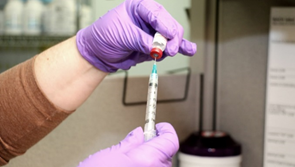
People were counting on the effective drugs for treatment, however, with this unprecedented virus, all the scientists and doctors could do was to test all possible options and see which one or few could work. Among all the drugs used, Remedesivir, an experimental drug from a US biotech company, once raised global hopes. This promising treatment also caught the eyes of IP industry.
According to the Wuhan Institute of Virology, it has applied to patent the use of Gilead Sciences' remdesivir on January 21 to treat the current coronavirus outbreak. The American biotechnology company has partnered with Chinese health authorities to run a Phase III clinical trial to assess remdesivir for treatment of the virus. The drug was originally developed to treat the Ebola virus, but wasn't effective. Preclinical assays have suggested that the drug might be effective against the coronavirus, 2019-nCoV, as was published in the New England Journal of Medicine (NEJM). The drug was given to a U.S. patient for compassionate use on day seven of the disease and their condition improved on day eight. The new clinical trial will be conducted at Friendship Hospital in Beijing, China. The trial will enroll 270 patients with mild and moderate pneumonia caused by the virus.
Rejection of unscrupulous enterprise's registration of anti-epidemic trademark
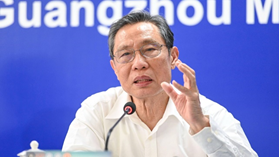
Heroes often emerges when crisis happened. Doctor Li Wenliang, a 34-year-old ophthalmologist at Wuhan Central Hospital, became a national hero who had once tried to warn people about the existence of a contagious SARS-like virus. Doctor Li died at 9:00pm on Feb 6, after being diagnosed infected during the course of his work battling the pneumonia epidemic. After his death was confirmed, most Chinese netizens left messages under his one last post on his Weibo account, repeating a literary verse to express their gratitude for a man they felt deserve better. “He who holds the firewood for the masses,” they wrote, “is the one who freezes to death in wind and snow.”
While the whole nation has been united in its battle against the novel coronavirus, it is hard to neglect that some people with ulterior motives, who foresee the benefits behind the Dr. Li and register his name, in seeking to profit from it.
Two companies that rushed to register Wuhan City Hospital ophthalmologist Li Wenliang apologized publicly for the trademark. On February 27, the legal representatives of Changsha Fuchatang Electronic Commerce Co., Ltd. and Dongguan Tres Intelligent Technology Co., Ltd. posted apology letters saying that they had deeply recognized their wrongdoings and had taken the initiative to withdraw the relevant trademark applications.
Changsha Fuchatang Electronic Commerce Co., Ltd. applied for a total of 4 trademarks of "Wen Liang" and "Li Wen Liang", which are categories of convenience food, medicine, and medical devices, and their states are awaiting review; Dongguan Tres Intelligent Technology Co., Ltd. applied for a total of five registered trademarks "Li Wenliang", which were classified as medical equipment, clothing and shoes, medicine, advertising sales, and convenience food. The status is also pending review.
The Changsha Intellectual Property Office will work with relevant departments to further strictly control and severely crack down on the application for registration of abnormal trademarks related to the epidemic situation, and effectively regulate the order of trademark registration.
CNIPA stated on the official Weibo on February 28 that Li Wenliang was an ophthalmologist at Wuhan Central Hospital. He died unfortunately after receiving a new contract of pneumonia. The use or registration of his name as a trademark is likely to cause significant social adverse effects. "Li Wenliang" trademark registration application shall be rejected according to law.
In respond to more potential bad faith registration, CNIPA quickly react to give special scrutiny to more than 1,500 trademark applications related to the epidemic.
As of March 5, the National Intellectual Property Administration had turned down 100 bad faith trademark applications in connection with the epidemic for "their potential to cause negative social effects" in accordance with China's Trademark Law. These applications attempting to trademark Chinese names such as Li Wenliang, Zhong Nanshan, Huoshenshan and Leishenshan were filed by 55 applicants, according to CNIPA.
Apart from Li Wenliang mentioned above, Zhong Nanshan is a prominent respiratory specialist who led Chinese people against the SARS epidemic in 2002-03. At the age of 83, he has again stuck to the frontline during the ongoing coronavirus outbreak. Huoshenshan and Leishenshan are the names of two emergency hospitals recently built to treat infected patients in Wuhan. Construction workers toiled around the clock and tens of millions of people across the country watched the hospitals rise via livestream to show support.
These names "symbolize the unity of the Chinese people in the fight against the disease", CNIPA said. "Applications filed by applicants other than the hospitals themselves are likely to cause significant negative social effects and are therefore rejected." Trademark agencies or individual agents involved in bad faith registrations will be punished by regulators of multiple sectors and be given no or very limited access to policy incentives and government programs. The breaches will also mark their credit history.
Participation of emerging technologies during anti-virus battle
While doctors and nurses are working on the frontline, domestic tech companies have also launched multiple products and technologies to help prevent and control the epidemic since its outbreak.
Wearing masks has been considered as an effective way of preventing the spread of virus and avoiding infection. However, the shortage of supply makes mask a new type of “luxury”. Thanks to a company in Shanghai, a new nano-tech face mask was developed.
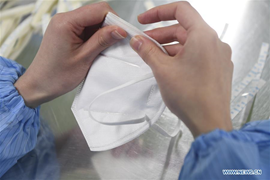
The new product can endure repeated sterilization through boiling water, alcohol or disinfectant, and has 20 times the service life of a regular surgical mask, which is expected to come into the market within the coming weeks. Produced by Juchen Infant and Children's Clothing Co Ltd, the new mask used a high polymer material from Hanpu New Material Science and Technology Co Ltd, both based in Fengxian district, Shanghai.
Juchen was founded in 1994, with a main business of producing children's clothing. The company played an important role in developing and producing face masks for combating the SARS outbreak in 2003. As the novel coronavirus epidemic emerged, the company had planned to reform its production lines to make regular masks. The idea was turned down by the Shanghai Municipal Commission of Economy and Information, which then suggested the company should innovate and create new masks that can be used repeatedly.
The commission helped introduce Juchen to Hanpu, a new corporation founded in 2018. Recently Hanpu acquired a national patent for a new material, a thin film of nanofiber, and this was the first time the material was used in face mask production. The micropores in the material can filter 95 percent of tiny objects with a diameter bigger than 75 nanometers, which is the quality standard of N95 face masks. According to the paper, the novel coronavirus has a diameter of about 100 nanometers, while the fine particulate matter in air pollution known as PM 2.5 is 2,500 nanometers or 2.5 microns.
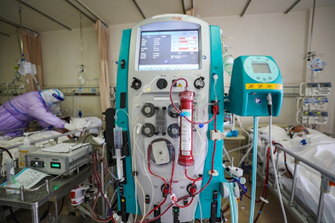
In clinical experience of fighting the virus, especially treating patients in critical condition, ECMO is a life-saving machine. An ECMO (Extra-Corporeal Membrane Oxygenation) machine is a kind of life support device, may be used during life-threatening conditions such as severe lung damage from an infection, which is exactly the condition that severely infected people faced in this novel coronavirus pneumonia.
Up to now, the ECMO market in China is dominated by one US brand and two German brands. Until recently, a team in Shandong University has developed an ECMO machine at a lower cost than foreign brands that is expected to move into mass production amid the country's efforts in fighting novel coronavirus pneumonia.
A 16-member team consisting of researchers from fields including fluid engineering, emergency medicine, cardiac surgery, critical care, electrical engineering and systems and control engineering spent more than 10 years developing the new machine. They successfully developed the ECMO pump with full magnetic levitation technology. Working as an artificial heart, the pump is one of two crucial parts. The other is the artificial lung that has already been produced in China. The team has applied for three patents for their invention, two of which have been approved.
IP services switched to online and supportive measures were taken by authorities
To tackle the virus wholeheartedly, Chinese courts are seeking new way of service. The concept of virtual court has been raised and implemented.
"The unprecedented public health emergency of COVID-19 has pushed courts across the country to start testing online trials. The Beijing Internet Court can share the experience from our pioneering practices and help set protocols of online litigation proceedings in cyberspace," said Zhang Wen, president of the Beijing Internet Court.
The online work model has made the internet courts one of the few sectors that have not been impacted by the outbreak of the novel coronavirus. Based on the e-litigation platform, the whole process of litigation from case filing to ruling and meditation is conducted online. The Beijing court also has a "mobile micro court," a mini-program on China's leading social media platform of WeChat. It offers on-hand legal services on mobile devices for those who do not have a computer at home.
President Zhang said from Feb. 3 to Feb. 20, an intense period of the epidemic when nearly all residents stayed at home, the court received 2,681 file applications, with a daily average of 150, basically the same as the volume before the epidemic outbreak.
Apart from judicial system, China Intellectual Property Administration was also making efforts to release the burdens lying on the enterprises and individuals.
CNIPA has announced it will not seek late fees for missed patent annuity payments, if the reason can be traced back to the ongoing COVID-19 epidemic. On its website, the CNIPA explained that any time limits for trademark-related matters can be suspended from when a user “was hospitalised or isolated after being infected with the novel coronavirus” or from that date that any business has suspended operations “due to the prevention and control measures”. In those cases, the deadline will be extended “until the date when the infected user is discharged from hospital, or when the isolation ends, or when the business resumes work”. Further, trademark registrants that do not renew their trademark within the extension period due to the epidemic can apply for an additional two-month extension.
Big data showing its value in the combat to virus

Not just state-owned institutions, other domestic companies were contributing to combat disease nationwide.
A host of technologies and products from companies in Beijing's Zhongguancun Science Park, known as China's Silicon Valley, are being used in the fight against the novel coronavirus, according to a list recently released by the park. The list includes 137 technological products from 86 companies. These technologies relate to epidemic prevention and control in 12 fields, such as temperature monitoring, artificial intelligence-assisted diagnosis and treatment as well as big data information research and development services.
The listed products and services all have proprietary intellectual property rights and most of them are available immediately for combating the epidemic, the park said.
Fifteen technological products from tech giant Baidu are on the list, covering sectors including AI and big data. Among them is an intelligent robocall platform, requesting people voluntarily provide their recent travel history, close contacts and current health conditions.
Baidu Research has opened its AI-powered algorithm Linear Fold for free to gene-testing agencies, epidemic control centers and research institutions around the world. The algorithm can help shorten the time required to analyze the secondary RNA structure of the virus from 55 minutes to 27 seconds
Another listed item is an intelligent diagnosis system developed by BestNovo (Beijing) Medical Technology. Based on AI and medical technologies, the system is designed to provide patients with health guidance and medical advice, and assist doctors in identifying patients' conditions to optimize diagnosis, according to the company. So far, the company has donated 50,000 nucleic acid testing and antibody detection reagents to front-line hospitals in provinces including Hubei, Shandong and Jiangsu. It has also given nearly 10,000 nucleic acid testing reagents to more than 20 countries including Japan, South Korea and the European Union.
Global influence and joint efforts
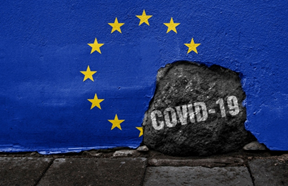
As the coronavirus outbreak has unfolded and spread to more than a hundred countries in the world, the epidemic has also had a significant impact in the IP world. In terms of mass gatherings, many IP events have been cancelled or postponed, the INTA annual meeting was one of them. The International Trademark Association (INTA) will hold its 2020 annual meeting at a US venue in November. This year’s meeting was set to be held in Singapore in April, but was postponed due to the outbreak of COVID-19. IP offices worldwide also took measures to minimise user impact. The US Patent and Trademark Office (USPTO) has announced it will waive petition fees in certain situations, amid the coronavirus pandemic. The European Union Intellectual Property Office (EUIPO) has extended its deadlines until May 1 in light of the COVID-19 pandemic in Europe. The World IP Organisation (WIPO) has released an information notice explaining remedies it has taken. Key measures include the automatic extension of time limits when a national IP office is not open to the public, and urging all brand owners to "use electronic communication to minigate the negative effects of possible disruptions in mail or delivery services".
Part Information in this article comes from multiple sources:
China Daily, Court.gov.cn, World Intellectual Property Review, IP Offices











